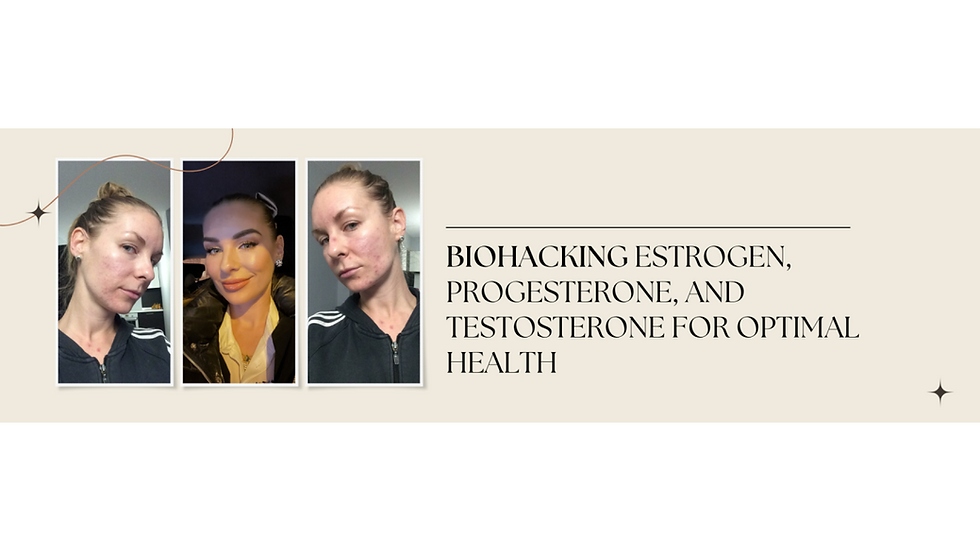Biohacking hair loss: How I took control of my hair health, hormones, and stress
- Biohacking Bee
- Mar 20
- 4 min read
Hair loss is something most people don’t think about—until it starts happening to them. I know, because I’ve been there. For years, I dismissed the signs, thinking it was just stress or a phase. But as I dove deeper into biohacking, I realised that hair loss isn’t just about genetics—it’s a complex interplay of hormones, nutrition, lifestyle, and environmental factors.
What started as frustration turned into a mission. Instead of accepting hair thinning as inevitable, I began experimenting with biohacking techniques to strengthen, regrow, and maintain healthy hair. And just like with sleep (my previous article), I found that the solutions weren’t in quick fixes but in understanding how my body works and supporting it holistically.
The Hidden Causes of Hair Loss: It’s more than genetics
The mainstream narrative tells us that hair loss—especially male or female pattern baldness—is purely genetic. While genetics do play a role, they’re not the full story. Hair loss can be triggered or accelerated by:
🧬 Hormonal Imbalances – Elevated DHT (dihydrotestosterone) levels are linked to hair follicle shrinkage, but excess cortisol (the stress hormone with which I had quite a journey with) also contributes by disrupting hair growth cycles. And if you read my previous article, you already know that cortisol and sleep deprivation go hand in hand. Poor sleep = elevated cortisol = increased inflammation, which affects everything from metabolism to hair health.
🍽️ Nutritional Deficiencies – Hair is an extension of our overall health. Deficiencies in zinc, biotin, vitamin D, and iron can significantly impact hair growth. Poor protein intake also weakens hair structure. I already saw how balancing my diet helped improve sleep and energy, so it was no surprise that better nutrition played a major role in hair health too.
⚡ Inflammation & Oxidative Stress – Chronic inflammation (from poor diet, gut issues, or environmental toxins) can weaken hair follicles. High oxidative stress accelerates aging, including hair thinning. This is another reason why cold exposure (like the sauna + cold shower routine I mentioned before) became a key part of my recovery. It reduces systemic inflammation, which in turn supports healthier hair growth.
🚿 Scalp Health & Blood Flow – Poor circulation to the scalp starves hair follicles of oxygen and nutrients. Overuse of harsh shampoos or buildup of toxins on the scalp further weakens hair. Just like deep sleep restores your brain and body, proper circulation and scalp health restore your hair follicles.
🛌 Sleep & Recovery – Sleep deprivation disrupts growth hormone and melatonin production, both of which are crucial for hair regeneration. I learned that prioritizing sleep wasn’t just about energy and stress management—it was also affecting my hair loss.
Biohacking hair growth: what worked for me
Through trial and error, I tested multiple strategies to stop hair thinning and improve regrowth. Here’s what made the biggest impact:
1️⃣ Balancing Hormones & Lowering Stress
- I optimized my circadian rhythm, which I had already worked on for better sleep, by waking up with the sun, reducing blue light exposure at night, and keeping my sleep schedule consistent. When my sleep improved, so did my stress levels, and in turn, my hair started responding.
- Adaptogens like ashwagandha and rhodiola helped me manage cortisol levels.
- I introduced cold exposure (cold showers/plunges) after sauna sessions, which lowered inflammation and boosted circulation—not just for my overall health but also for my scalp.
2️⃣ Nourishing Hair from the Inside Out
- Increased my intake of collagen, amino acids (lysine, cysteine), and omega-3s to support keratin production.
- Focused on iron-rich foods (grass-fed meats, leafy greens) and took vitamin D, biotin, and zinc supplements to fill in nutritional gaps—similar to how I adjusted my diet to improve my sleep.
- Prioritized gut health with probiotics and bone broth, ensuring proper nutrient absorption.
3️⃣ Enhancing Scalp Health & Blood Flow
- Daily scalp massages with rosemary oil (proven to be as effective as minoxidil) improved hair thickness.
- Red light therapy (LLLT) enhanced scalp microcirculation and cellular repair. Interestingly, red light therapy also helps regulate melatonin production, which ties back to sleep quality—everything in the body is connected.
4️⃣ Limiting Hair Damage
- Stopped using sulfates and harsh shampoos that strip natural oils, opting for a mild, pH-balanced shampoo instead.
- Avoided tight hairstyles and over-washing, which can lead to breakage. For those who know me, they know a ponytail is an extension of me (or at least it was) lol 😊
5️⃣ Tracking Progress with Biometrics
- Used blood tests to monitor key hair-related markers like ferritin, thyroid hormones (TSH, T3, T4), and inflammatory markers (CRP)—just like I track my sleep and recovery data.
- Measured hair density and regrowth with monthly scalp photos to track real improvements.
The Ripple effect of Biohacking hair health
This journey wasn’t just about hair—it was about understanding my body better. Just like how improving my sleep had a ripple effect on my mood, energy, and productivity, optimizing my hair health forced me to look deeper into stress, inflammation, and recovery. I wasn’t just fixing my hair; I was building a healthier body overall.
And that’s the beauty of biohacking—everything is interconnected. Better sleep reduces stress. Less stress lowers inflammation. Reduced inflammation improves hair health. It all comes full circle.
Takeaway: your hair reflects your health
Hair loss is a symptom, not a final sentence. By addressing the root causes—hormones, inflammation, nutrition, and lifestyle—you can take back control.
What’s your experience with hair loss? Have you tried any biohacks to improve hair health?
Let’s connect and share insights—I’d love to hear about your journey! 😊






Comments